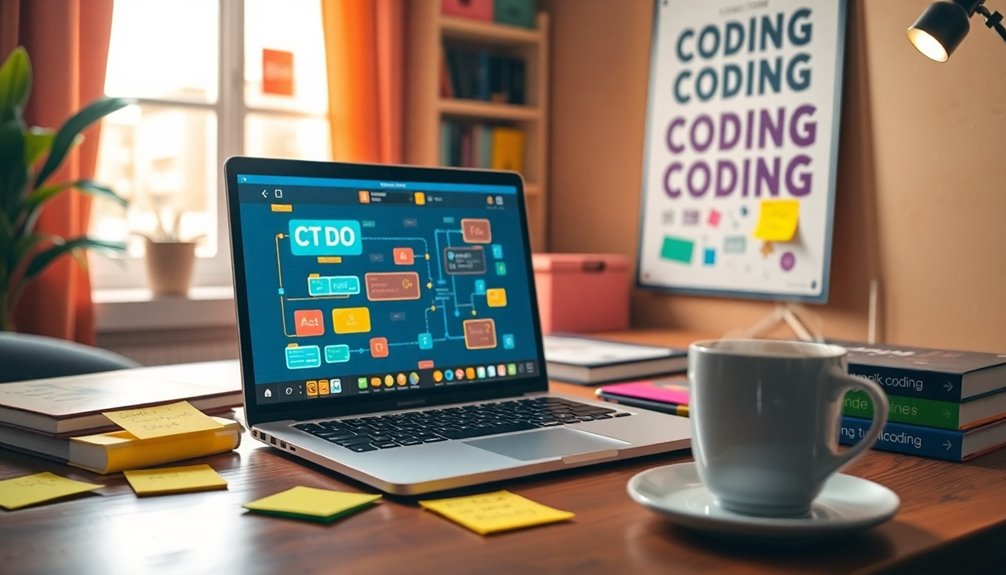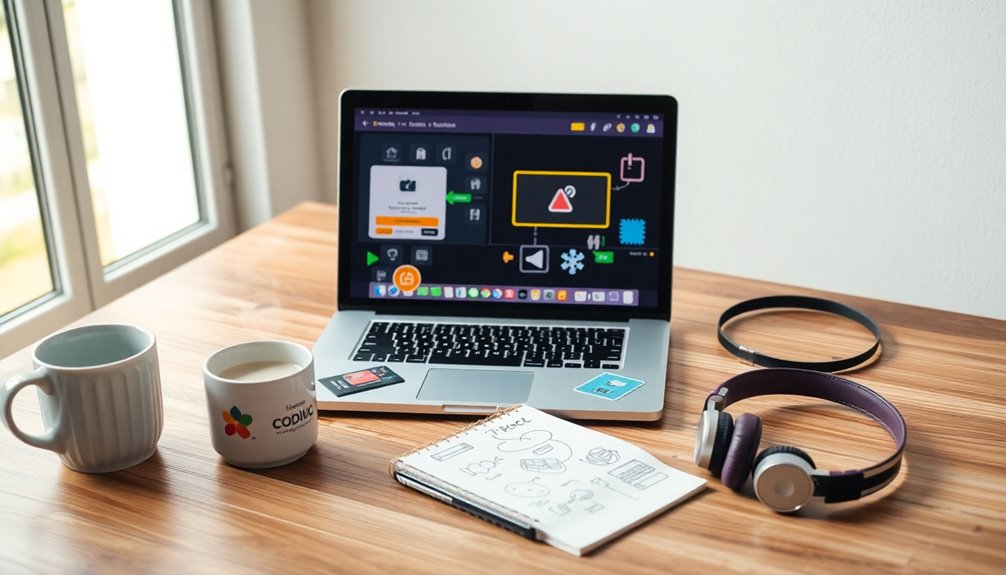If you're enthusiastic to start coding, I recommend exploring games like CodaKid's Minecraft Coding and Roblox Coding for Kids. They make learning fun, engaging you in real programming while creating games. Don't miss out on the Beginners Step-by-Step Course, which simplifies coding concepts effectively. If you're interested in game development, Code Gamers Development is a great choice. There are many other exciting options that will inspire you to code; keep discovering to find the best fit!
Key Takeaways
- Interactive coding games like Minecraft and Roblox engage beginners while teaching programming concepts through fun, hands-on projects.
- Platforms offering structured courses provide clear progression and multiple levels to effectively build coding skills.
- Coding games often feature challenges and quests that promote problem-solving and critical thinking in an enjoyable way.
- Access to mentor support and resources enhances the learning experience for beginners facing technical issues or needing guidance.
- A variety of project types in coding games ensures learners remain motivated and can explore different interests in programming.
Coding for Kids with Minecraft – Learn Real Computer Programming
If you're looking for a fun and engaging way for your child to immerse themselves in coding, CodaKid's Minecraft Java coding software is a perfect choice. With over 90 hours of interactive lessons designed for kids aged 9 and up, it covers real Java programming and video game design. The course offers 22 modules, 85 quests, and 180 challenges, keeping things fresh and exciting. I love how short lessons fit into busy schedules, and kids can easily shift from playing to creating in Minecraft. Plus, support is available anytime, which makes the experience even more enjoyable for young learners.
Best For: Kids aged 9 and up who are interested in coding and enjoy playing Minecraft.
Pros:
- Engaging and interactive lessons that make learning Java enjoyable.
- Clear progression through 22 modules, 85 quests, and 180 challenges.
- Unlimited live mentor assistance and 24/7 support enhance the learning experience.
Cons:
- Requires separate purchase of the Minecraft game, adding to overall costs.
- Some users have reported issues with technical support and installation.
- Initial setup can be time-consuming with multiple programs needed.
CodaKid Roblox Coding for Kids (Ages 9+)
CodaKid's Roblox Coding for Kids course is an excellent choice for kids ages 9 and up who are enthusiastic to plunge into the world of coding and game design. With over 100 hours of interactive projects, students learn Lua coding and game design through Roblox Studio in just 8 to 10-minute lessons. The course's structure, featuring 19 modules and 161 challenges, keeps kids engaged and fosters creativity. Plus, the 12-month access includes unlimited LIVE mentor support, which can be a game-changer. While some users faced tech support delays, the overall excitement and learning experience make it a worthy investment for budding coders.
Best For: Kids ages 9 and up who are eager to learn coding and game design in a fun and interactive way.
Pros:
- Engaging structure with over 100 hours of interactive projects that foster creativity and coding skills.
- Short lessons (8-10 minutes) make it easy to fit into busy schedules.
- Includes 12 months of unlimited LIVE mentor support for personalized assistance.
Cons:
- Some users experienced delays with tech support, leading to frustration.
- Confusion regarding product format, particularly around the delivery method (code on paper vs. disc).
- Additional fees and restocking fees raised concerns about overall value for some users.
Beginners Step-by-Step Coding Course: Learn Computer Programming the Easy Way
The "Beginners Step-by-Step Coding Course" is perfect for those who've never written a line of code before and want to ease into the world of programming. This book serves as an informative introduction, offering a solid foundation in coding concepts. Its highly visual and well-paced format makes it easy to follow, with practical projects for each programming language introduced. While it won't turn you into a master programmer, I found it engaging and enjoyable. However, be aware that some content feels outdated, and packaging issues can be a hassle. Overall, it's a great starting point for any coding journey.
Best For: Beginners with no prior coding experience looking for an easy and engaging introduction to programming concepts.
Pros:
- Highly visual and well-paced format that is easy to follow.
- Includes practical projects for each introduced programming language to enhance learning.
- High production values with clear illustrations, making it a good starting resource.
Cons:
- Some content may feel outdated regarding current programming practices.
- Limited comprehensiveness; additional resources may be needed for deeper learning.
- Packaging and format issues can lead to damage or unreadability.
Code Gamers Development: Essentials – A Beginner's Guide to Game-Development Career
For aspiring game developers with little to no programming experience, "Code Gamers Development: Essentials" is a fantastic choice. This 9-week guide simplifies C# programming and game development, making it accessible and engaging. It starts with the Unity engine and covers C# basics like data types, operators, and loops. I love how it includes practical tips and a hands-on demo project, allowing me to apply what I learn in real-time. Plus, the insights into the game industry help me understand various roles and prepare for interviews. This book has truly set me on the right path to a game development career.
Best For: Aspiring game developers with little to no programming experience looking for a structured and engaging introduction to C# and Unity.
Pros:
- Provides a clear and accessible approach to learning C# programming and game development.
- Includes practical tips and a hands-on demo project for real-world application of skills.
- Offers insights into the game industry, including roles, portfolio preparation, and interview expectations.
Cons:
- Absolute beginners may need to research some technical terms for better understanding.
- It may not cover every aspect of the game industry in depth.
- The 9-week structure may feel rushed for some readers who prefer a slower pace.
JavaScript Coding for Teens: A Beginners Guide to Developing Websites and Games
Looking to plunge into coding without feeling overwhelmed? "JavaScript Coding for Teens" is perfect for beginners, whether you're a teenager enthusiastic to develop websites and games or an adult starting from scratch. This guide breaks down essential concepts like variables, functions, and loops in a clear, structured way. I appreciated the Coders Checklists and Hacker Hints, which kept me motivated. The hands-on tutorials let me code alongside the book, reinforcing my understanding. Although some content feels a bit outdated, it remains a solid introduction to JavaScript, making it a great stepping stone into the world of coding.
Best For: Beginners of all ages, especially teens, who want to learn JavaScript coding for developing websites and games.
Pros:
- Clear and structured explanations make it easy to follow for beginners.
- Hands-on tutorials encourage coding practice alongside the reading.
- Coders Checklists and Hacker Hints provide motivation and reinforce understanding.
Cons:
- Some content may feel outdated, particularly regarding ES6+ standards.
- Technical issues, such as readability of coding images on Kindle, can hinder the learning experience.
- Limited depth on advanced topics may leave readers wanting more after the basics.
The Gamers Guide to Coding: Design, Code, Build, Play
Designed specifically for gamers enthusiastic to plunge into coding, "The Gamers Guide to Coding" makes learning web development engaging and accessible. It introduces HTML, CSS, and JavaScript fundamentals, covering everything from basic inputs to conditionals and loops. I found the content easy to follow, perfect for beginners. Many readers, including myself, breezed through chapters, making it an excellent starting point, especially for younger audiences. While it offers surface-level knowledge, I recommend pairing it with YouTube tutorials for deeper insights into game coding. Overall, it's a fun way to spark interest, but don't expect in-depth game development discussions.
Best For: Gamers interested in learning the basics of coding and web development, especially beginners and younger audiences.
Pros:
- Engaging and easy-to-follow content that is suitable for those with little prior knowledge of programming.
- Website support for code samples and additional game code enhances the learning experience.
- Potential to spark interest in programming for younger readers, making it a great introductory resource.
Cons:
- Provides only surface-level knowledge with limited depth and practical examples.
- Lacks discussion on how coding applies to popular games, which may leave readers wanting more context.
- May be more suitable as a gift for beginners rather than a serious reference for aspiring game developers.
Coding Games in Python (DK Help Your Kids)
"Coding Games in Python" stands out as an excellent choice for parents keen to introduce their kids, particularly those ages 7 to 14, to the world of programming. This engaging book over 200 pages introduces coding through fun, game-oriented projects. With chapters that progressively build skills, kids learn to create games using simple retro graphics and Pygame Zero. It's perfect for beginners, requiring just a Raspberry Pi setup. I love how it emphasizes experiential learning over theory, keeping kids enthusiastic to dive deeper. Plus, the tips at the end of each chapter inspire creativity, making learning both enjoyable and effective!
Best For: Parents looking to introduce children aged 7 to 14 to programming through engaging game development projects.
Pros:
- Engaging and fun, making learning programming enjoyable for kids.
- Progressive chapters build coding skills step-by-step, perfect for beginners.
- Encourages creativity with tips and suggestions at the end of each chapter.
Cons:
- Code quality may not meet professional standards, which could be a concern for some.
- Some users reported errors in specific chapters, which could hinder learning.
- Lack of an online companion with videos for complex concepts may limit understanding.
Coding for Kids: Python: Learn to Code with 50 Awesome Games and Activities
If you're a parent wanting to introduce your child to the world of programming, "Coding for Kids: Python: Learn to Code with 50 Awesome Games and Activities" is an excellent choice. This book is perfect for kids aged 7-13, featuring engaging games and activities that make learning Python fun. Its clear language and colorful illustrations keep children interested while covering essential coding concepts. Although some activities may seem basic, the hands-on approach helps kids develop problem-solving skills. You'll likely find it beneficial to guide them through the exercises, turning screen time into a productive and enjoyable learning experience together.
Best For: This book is best for children aged 7-13 who are new to coding and want to learn Python through fun and engaging activities.
Pros:
- Engaging format: The book includes 50 games and activities that make learning Python enjoyable and interactive.
- Clear explanations: The language and illustrations are straightforward, making complex concepts accessible for young learners.
- Skill development: Children not only learn coding but also enhance their math and logic skills through problem-solving exercises.
Cons:
- Limited depth: The content may not be challenging enough for experienced young coders or those with prior programming knowledge.
- Variable engagement: Some activities may not capture the interest of all children, leading to a lack of motivation.
- Need for adult supervision: Young learners may require guidance to navigate the exercises effectively, which might limit independent learning.
Coding Roblox Games Made Easy, 2nd Edition
For kids aged 11 to 14 enthusiastic to immerse themselves in the world of game development, "Coding Roblox Games Made Easy, 2nd Edition" is an ideal choice. This engaging book helps beginners navigate Roblox Studio with clear guidance and colorful illustrations. I've seen kids, including my friends, dive into it at night, exploring game creation step-by-step. Chapters on scripting and battle-royale games are particularly helpful. While some concepts like Tables might be tricky, the overall clarity and organization make learning enjoyable. Compared to online resources, this book stands out as a fun and effective way to grasp coding in Roblox and Lua.
Best For: Kids aged 11 to 14 who are eager to learn coding and game development through Roblox.
Pros:
- Engaging and clear guidance makes it suitable for beginners.
- Colorful illustrations and excellent print quality enhance the learning experience.
- Focuses on practical applications, helping users create their own games effectively.
Cons:
- Certain concepts, like Tables and Vectors, may be challenging for beginners without additional visual aids.
- Some users suggested the inclusion of a CD for practical coding examples.
- Might not cover advanced topics for those with more experience in coding.
Coding for Kids: Simple HTML, CSS and JavaScript Lessons
Young learners aged 9-15 are in for a treat with "Coding Games for Beginners," as it offers an engaging way to immerse themselves in the world of web development through simple HTML, CSS, and JavaScript lessons. I found it to be an excellent introductory guide, perfect for my 10-year-old nephew, who loves coding. The practical focus really helps beginners grasp concepts easily. While some users mentioned issues with unclear instructions and small text, the overall feedback has been positive. It's a fantastic resource for young coders to kickstart their programming adventures and release their creativity online!
Best For: Young learners aged 9-15 who are interested in starting their coding journey in web development.
Pros:
- Excellent introductory guide for beginners with simple lessons in HTML, CSS, and JavaScript.
- Practical focus helps young learners easily grasp coding concepts.
- Positive feedback from users, highlighting its effectiveness for kids and teens.
Cons:
- Some users reported confusion due to unclear instructions.
- Issues with small and blurry text in printed figures.
- Poorly organized pages leading to visibility issues and confusion.
Coding Games in Scratch
Coding Games for Beginners is an excellent choice for anyone looking to plunge into the world of programming, especially those who are new to coding. I love how Scratch makes learning accessible for all ages, from kids to adults. With clear, step-by-step instructions and engaging projects, I found it easy to grasp programming basics. One of my favorite aspects is how it channels my passion for gaming into productive learning. While some updates could be more frequent, the value is undeniable. If you're considering a fun way to start coding, Scratch is definitely worth exploring!
Best For: Kids and adults who want to learn programming basics through engaging and fun projects using Scratch. With its intuitive interface and interactive nature, Scratch is perfect for fostering creativity while teaching essential coding skills. Additionally, users can explore programming concepts in a playful environment that encourages experimentation. For those interested in home improvement, combining the logic skills learned through programming with practical tasks like using the best walkbehind floor tile scrapers can lead to a well-rounded skill set.
Pros:
- Clear, step-by-step instructions make it easy for beginners to follow.
- Engaging projects help to channel gaming passion into productive coding practice.
- Suitable for a wide age range, making it a versatile educational resource.
Cons:
- Some users feel that updates in new editions are not frequent enough.
- Caution is advised regarding the publisher's reliability for educational materials.
- It may be beneficial to explore multiple resources for a more comprehensive coding education.
Playz My First Coding & Computer Science Kit
Introducing children to foundational computer science concepts, the Playz My First Coding & Computer Science Kit is perfect for kids ages 6 and up. I love how it engages young minds with over 30 hands-on activities, from creating binary necklaces to solving mystery mazes. The colorful lab guide makes learning easy and fun, promoting STEM skills without a computer. I've seen kids improve their understanding of basic coding concepts, and parents rave about how it keeps their children excited. With a 4.3-star rating from over 1,500 customers, this kit is a fantastic way to kickstart a child's programming journey!
Best For: This kit is best for children ages 6 and up who are eager to learn foundational computer science concepts through hands-on activities.
Pros:
- Engaging hands-on activities that promote STEM learning and critical thinking.
- Colorful lab guide with easy-to-follow instructions enhances the learning experience.
- Positive customer feedback highlights improvements in children's understanding of coding concepts.
Cons:
- Some parents may find the kit's activities too simplistic for older children.
- Limited advanced concepts may not satisfy more experienced young coders.
- Requires parental involvement to guide younger children through the activities.
Unity from Zero to Proficiency (Beginner): A Step-by-step Guide to Coding Your First Game
For anyone enthusiastic to plunge into game development and feels overwhelmed by the complexities of programming, "Unity from Zero to Proficiency (Beginner)" is an excellent choice. Patrick Felicia's structured approach makes learning Unity and C# manageable and enjoyable. The series gradually builds your skills, starting from the foundations and moving to more advanced concepts. I appreciated the visuals and clear explanations that kept me engaged. Even though some typos exist, the overall content is valuable. Plus, the downloadable resources and video tutorials on his website enhance the learning experience. This guide truly reignited my passion for game development!
Best For: Beginners in game development who are eager to learn Unity and C# in a structured and engaging manner.
Pros:
- Clear and accessible explanations make complex concepts easy to understand.
- Step-by-step approach allows gradual skill building with manageable information.
- Additional resources such as downloadable materials and video tutorials enhance the learning experience.
Cons:
- Some typos and inconsistent terminology may hinder comprehension.
- Newcomers to programming might find it beneficial to take a basic programming course beforehand.
- Continuous updates to Unity and C# could affect the applicability of some guidance in the book.
Base Kit Computer Coding Game for Kids 8-12
The Base Kit Computer Coding Game stands out as an exceptional choice for kids aged 8 to 12 who are enthusiastic to plunge into the world of programming. With over 60 projects focusing on C++, it's a hands-on experience that fosters critical thinking. I love the self-paced format, which includes 3.5 hours of video walkthroughs and more than 55 online challenges. The circuit board offers immediate feedback, making learning fun and interactive. Plus, the US-based support guarantees help is just a chat away. This game not only teaches coding but also combines it with real science, making it an invaluable tool!
Best For: Kids aged 8 to 12 who are eager to learn programming through interactive coding projects.
Pros:
- Engaging hands-on learning with over 60 C++ projects and video walkthroughs.
- Immediate feedback through a circuit board, enhancing the coding experience.
- US-based support available for troubleshooting and assistance.
Cons:
- Some customers reported concerns about the quality of components.
- A few reviews mentioned missing items in the kit.
- Requires internet access and is not compatible with tablets or smartphones.
Python Playground: Coding Games and Projects for Kids and Beginners
Coding Games for Beginners shines as an ideal choice for kids and beginners enthusiastic to plunge into programming. I found Python Playground to be a fantastic resource, packed with engaging projects that spark creativity. My 10-year-old loved following the step-by-step instructions, which made learning Python easy and fun. The variety of projects kept her excited, allowing her to explore different ideas and build her own games. It's heartwarming to see her joy in coding, and I highly recommend this book as a perfect gift for young learners. It truly makes programming approachable and enjoyable for everyone!
Best For: Python Playground is best for kids and beginners who are eager to learn programming in a fun and engaging way.
Pros:
- Engaging projects that spark creativity and maintain interest in coding.
- Step-by-step instructions that are clear and easy to follow, making it suitable for beginners.
- Variety of projects allows learners to explore different ideas and develop their own games.
Cons:
- May not cover advanced topics, limiting progression for those who want to delve deeper into programming.
- Some projects may require additional resources or tools not included in the book.
- The focus on games might not appeal to all learners who prefer different coding applications.
Factors to Consider When Choosing Coding Games for Beginners

When I'm choosing coding games for beginners, I think about a few key factors. Age appropriateness, learning style compatibility, and how engaging the content is really matter. I also consider whether there are hands-on activities and the complexity of the language used, since these can make a big difference in the learning experience.
Age Appropriateness
How can we guarantee that the coding games we choose are truly suitable for beginners? First, we need to align the game's content with the cognitive and motor skills of the target age group. Many games cater specifically to kids aged 7-14, offering engaging experiences that match their developmental stages. Always check the recommended age range in the game's description; it usually indicates the complexity of concepts being taught. For instance, games for younger kids (ages 6-9) typically focus on basic concepts with visual programming languages, while those for ages 10-14 may introduce languages like Python or JavaScript. Choosing age-appropriate games enhances engagement and motivation, leading to a more effective learning experience overall.
Learning Style Compatibility
Choosing age-appropriate coding games is only part of the equation; understanding a child's learning style can greatly enhance their experience. If your child is a visual learner, look for games with colorful graphics that simplify complex coding concepts through engaging visuals. For auditory learners, choose games featuring verbal instructions and interactive elements that allow them to listen to explanations while coding. Kinesthetic learners thrive with hands-on activities, so project-based games that encourage physical interaction can keep them engaged. Additionally, consider your child's interests—whether they're into gaming or storytelling—as this can guide you in selecting games that spark their enthusiasm and motivation to learn. Tailoring the game choice to their learning style makes all the difference in their coding journey.
Content Engagement Level
What makes a coding game truly engaging for beginners? I believe it's all about interactive elements and relatable themes. When a game includes coding challenges and hands-on projects, it allows beginners to apply what they're learning in a fun way. Themes that resonate with popular culture or gaming can make coding feel more relevant and enjoyable. Additionally, visual aids and clear, step-by-step instructions help simplify complex concepts, making them easier to grasp. I've noticed that a well-structured content progression, starting with the basics and gradually increasing in complexity, keeps learners motivated. Engaging content fosters a positive learning environment, encouraging continuous participation and making the coding journey both exciting and rewarding.
Hands-on Activities Availability
When exploring coding games for beginners, the availability of hands-on activities is a key factor that stands out. I've found that these activities greatly enhance engagement and provide practical experience, allowing us to apply coding concepts in real-world scenarios. Many coding kits and books feature interactive projects, like building games or tackling coding challenges, which reinforce learning through active participation.
Engaging in hands-on activities not only promotes critical thinking but also sharpens problem-solving skills essential to coding. I really enjoy activities that connect to real-life situations, such as crafting binary necklaces or creating encryption devices, as they make abstract concepts more relatable. Plus, immediate feedback from these projects helps us quickly identify and correct mistakes, solidifying our grasp of coding fundamentals.
Language Complexity
While exploring coding games for beginners, it's crucial to take into account the complexity of the programming language used, as it can greatly influence how easily I can grasp the concepts. Simpler languages like Scratch are usually more accessible, allowing me to focus on logic rather than getting bogged down by complicated syntax. Games that utilize visual programming can reduce cognitive load, making learning feel less overwhelming. If the language is too complex, I might feel frustrated and lose motivation. It's best to choose games that gradually increase language complexity, starting with basic commands and moving to advanced topics. Also, I should consider my age and experience level, as younger learners often thrive with simplified languages that spark creativity.
Progression and Structure
Choosing the right coding game involves considering its progression and structure, as this can greatly impact my learning experience. I look for games that offer a clear path with multiple levels that gradually increase in complexity. This step-by-step approach helps me build my skills effectively. Interactive components like quests and challenges keep me engaged and make learning enjoyable. I prefer lessons that are broken down into manageable segments, ideally around 8-10 minutes, so I can fit them into my busy schedule. Additionally, I seek resources that include practical projects and hands-on activities, allowing me to apply my knowledge in real-world scenarios. Finally, a mix of foundational concepts and advanced topics guarantees I can grow my coding knowledge at my own pace.
Technical Support Access
Access to technical support is one of the top factors I consider when selecting coding games for beginners. Having immediate assistance for installation issues, troubleshooting, and coding questions can really enhance the learning experience. I look for platforms that offer unlimited live mentor support and round-the-clock assistance, as these can be invaluable for beginners facing challenges. However, I've seen mixed reviews about technical support responsiveness, so I always research before committing. It's also essential to check if the support is tailored to the age group of the learners—simplified explanations can make a huge difference for younger users. Ideally, I prefer platforms that offer multiple contact methods like live chat, email, and phone support for convenience and accessibility.
Variety of Projects
When exploring coding games for beginners, I find that a diverse range of projects is vital for keeping learners engaged and motivated. Different project types, like building games or creating animations, cater to various interests and learning styles, making coding more appealing. Engaging projects reinforce concepts through practical applications, allowing us to see the results of our efforts. Plus, tackling various coding challenges stimulates creativity and encourages problem-solving skills. A broad array of projects guarantees we stay motivated, as we can progress from simple tasks to more complex challenges, giving us a sense of accomplishment. Ultimately, embracing variety in coding projects not only enhances our understanding but also makes the learning journey enjoyable and fulfilling.
Frequently Asked Questions
What Age Is Suitable for Starting Coding Games?
I believe there's no strict age for starting coding games; it really depends on the child's interest and comprehension level. I started exploring coding around age 8, and it felt like the perfect time for me. Younger kids can grasp the basics through fun, engaging games, while older kids can immerse themselves in more complex concepts. If they're curious, I'd say go for it—let them experiment and learn at their own pace!
Are Coding Games Effective for Learning Programming?
Absolutely, I believe coding games are effective for learning programming. They make complex concepts fun and engaging, which keeps me motivated. When I play, I get to solve problems and think critically, just like in real programming. The interactive feedback helps me learn from mistakes instantly, reinforcing my understanding. Plus, the gamified experience turns challenges into enjoyable quests, making me more likely to stick with it and improve my skills over time.
Can Coding Games Be Played on Mobile Devices?
You know what they say, "When it rains, it pours." Luckily, coding games can indeed be played on mobile devices! I've tried several myself, and they're both fun and educational. Whether I'm waiting in line or lounging at home, I can practice coding skills anytime. The touch controls make it easy to navigate, and many games offer engaging challenges. So, if you've got a mobile device, you're all set to plunge into!
Do I Need Prior Experience to Play Coding Games?
You definitely don't need prior experience to play coding games! When I first started, I plunged straight into it without any coding background, and I found it both fun and educational. These games often provide tutorials and guidance, making it easy to grasp the basics. I enjoyed learning through gameplay, and I believe you will too. Just plunge in, and don't worry about having any previous experience; you'll pick it up along the way!
How Do I Track My Progress in Coding Games?
Tracking my progress in coding games has been a game changer for me. I keep a journal where I jot down what I learn after each session. I also take screenshots of my achievements and milestones. Some games even offer built-in progress trackers, which I find super helpful. Regularly reflecting on my progress not only keeps me motivated but also helps me identify areas I need to improve. It's all about staying engaged!
Conclusion
So there you have it—15 coding games that promise to turn you from a clueless newbie into a tech wizard faster than you can say "syntax error." Sure, you might be just slightly more likely to understand your cat's meows than the intricacies of JavaScript, but hey, at least you'll have fun failing spectacularly! Immerse yourself in these games, and before you know it, you'll be coding like a pro—or at least pretending to, while still Googling everything. Happy coding!









